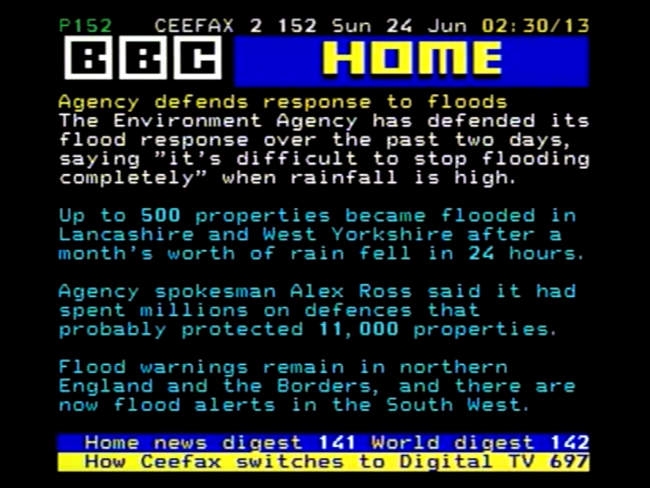Your website will benefit from long-form content because Google likes it, which is, in turn, because readers like it.
Back when the web was young, online copywriters would adhere to a simple rule: keep it short. After all, computer screens were small and download speeds were painfully slow.
It made sense. Most of us back then grew up reading print products, such as paperback books, newspapers and magazines. The most we ever read on screen was probably the description of a dungeon in a text adventure on a BBC Micro or Commodore 64.
In fact, what online writing resembled most in those early days was Teletext or Ceefax. This television information service gave reporters about 80 words to tell a complete story.

SOURCE: YouTube/BBC.
As a writer, I rather admire the discipline required to work in that restrictive format, but it’s not ideal if you want to convey nuance, detail or really engage your readers.
In the past decade or so, fortunately, things have changed.
Long-form content reborn
First, the coming of smartphones, affordable eReaders such as the Amazon Kindle, and tablet computers like the iPad, made on-screen reading the norm, everywhere and anywhere. Riding public transport, on the beach, in bed or even (annoyingly) while walking down the street, you’ll find people’s eyes fixed to mobile devices.
As a result, people began to seek out more substantial content – pieces of 1,500 words or more that they could really get stuck into over the course of a commute, taking the place of a magazine article.
Aggregators like Longform and Longreads came into being, helping people find chunky articles to save to apps, such as Pocket and Flipboard, to be read later like a bespoke publication of which they were the editor. No more wading through filler or pages of ads – just the good stuff, in a never-ending stream.
Then there’s social media. Though it’s often criticised for promoting endless grazing of low-value fluff, links to long-form content often go viral on services such as Twitter, and there’s evidence that long posts perform best on LinkedIn, too. There’s a certain cachet that comes from finding and sharing substantial articles, especially among serious-minded, politically and culturally engaged types. What you share is part of your personal brand.
Finally, in 2011, Google made the first in a series of important changes to its algorithm which gave quality content a serious advantage in search results. Shallow rubbish and plagiarism were out, material that was seen to really satisfy the needs of users – that answered the questions they were grappling with – was in.
Since then, various bits of research by SEO pundits has suggested that content of around 1,500 to 2,500 words consistently appears higher in Google searches than shorter pieces.
Again, as a writer, I think this is great news. It allows space to really explore ideas in as much depth as they warrant, to tell stories and let your prose breathe. Accountancy content in particular, which is by definition complex and nuanced, really benefits from room to offer examples, case studies and in-depth explanations.
Long-form but not dense
Now, it is still the case that large, dense blocks of text can be harder to read on screen, but that doesn’t mean you need to produce shorter items of content.
Just use more paragraph breaks than you might if you were writing for print – treating each sentence as its own paragraph wouldn’t be considered excessive these days. And use headings to break up the text, making it easier for readers to navigate.
Further reading: Melissa from PracticeWeb’s editorial team gives advice on formatting for online publication.
Our in-house SEO expert, David Fowler, also makes a good point about how long-form content is taken in:
“People don’t necessarily read long-form content from beginning to end,” he said.
“They’ll find it through a search for something quite specific, visit the page, and then use CTRL+F to find the answer to their question in the text.”
In other words, people see the length of a piece of writing as an indicator of its quality even if they only really have any use for 5% of it. Longform signals depth and detail.
David’s point about CTRL+F also highlights another good reason to produce long-form content: it naturally and ethically provides opportunities to use keywords and phrases, and especially so-called ‘longtail’ search terms.
For example, the superstar keyphrase might be ‘accountants in Derby’ – highly competitive and difficult to rank for. But terms such as ‘dental accountants in Derby’ or ‘Derby accountancy firms’, though fewer people are searching for them, may well bring a steady flow of valuable leads to your website.
With longform writing, you instinctively use variations to avoid repetition in your text – that’s just good writing – and the more you write, the more likely you are to have good reason to mention important words and phrases multiple times. The SEO benefit is almost incidental.
Don’t stretch your long-form content too thin
The American mystery writer Erle Stanley Gardner wrote heroic characters who were terrible shots. He was being paid by the word and could thus earn three cents for every extra ‘Bang!’ That’s certainly pragmatic, but it’s not how you end up with good prose.
The point is, it’s important to avoid writing long for the sake of it. It’s obvious when it’s happening – the same point made three times with slightly different words, for example, or pointless non sequiturs.
Instead, the trick to writing something long is to pick a really meaty subject that warrants the word-count, and to go into all the details thoroughly. Challenge yourself.
Even better, if you can, is to do the above but telling a story – ask a difficult question, lay out a narrative with twists and turns, or provide a satisfying arc of problem + solution = result.
This can be more difficult to do when writing about accountancy but it’s not impossible. For example, if you’re writing about the tax implications of share farming agreements, there’s a tale of heritage, culture and family tensions to be told.
If you can refer to specific case studies, real client stories, all the better. Names, faces, quotes – those are the ultimate hooks.
If after all that, your copy is still coming up short of the ideal, do some more research, or ask yourself another question.
And then, even when you have made your target word count, all the usual editorial rules should still apply – trim unnecessary words and cut anything that doesn’t add real value.
How PracticeWeb can help
Talk to us about commissioning long-form accountancy and finance content written for your website or about how our accountant SEO service can get your website found.




